Suing for a car accident in Colorado involves filing a lawsuit against the at-fault party to seek compensation for damages, which can include economic losses like medical bills and lost wages, as well as non-economic damages such as pain and suffering.
Colorado's modified comparative negligence rule allows injured parties to recover damages if they are found less than 50% at fault, and the amount of compensation may be influenced by factors like insurance coverage and the strength of evidence supporting the claim.
Seeking the guidance of an experienced personal injury attorney can be invaluable in navigating the complex legal process, building a strong case, and negotiating with insurance companies to pursue a fair settlement for a car accident claim in Colorado.
On this page, we’ll discuss how much someone can sue for a car accident in Denver, Colorado, factors impacting car accident lawsuit settlement amounts, steps to maximize your Denver car accident compensation, and much more.

Several key factors can influence the amount someone can sue for in a Denver, Colorado car accident lawsuit, including but not limited to:
If you’ve been injured in a car accident in Denver, Colorado due to someone else’s negligence, you may be entitled to significant compensation.
Contact Springs Law Group today for a free consultation to discuss your case and determine how much you may be able to sue for your car accident injuries and damages.

Suing for a car accident in Colorado involves filing a lawsuit against the at-fault party to seek compensation for damages.
Understanding the process and what it means to “sue” is crucial for anyone considering taking legal action after a car accident.
To “sue” someone for a car accident means filing a formal lawsuit against the at-fault party, which initiates a legal process involving a plaintiff (the injured party) and a defendant (the at-fault party).
The lawsuit begins with the filing of a complaint that outlines the legal issues and the compensation sought.
Suing someone is a serious step that involves court deadlines, discovery, and potentially a trial.
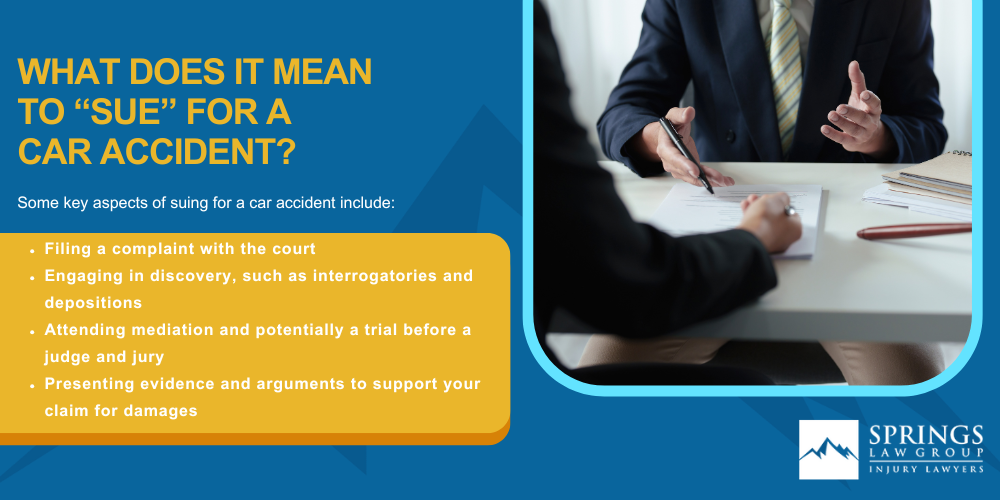
Some key aspects of suing for a car accident include:
Filing a lawsuit is a significant escalation from pre-settlement negotiations and should be considered carefully.
Filing a lawsuit for a car accident in Colorado follows a specific process that involves several stages.
The first step is to file a complaint with the court, which outlines the legal issues and the damages sought.
After the complaint is filed, the defendant is served with the lawsuit and given an opportunity to respond.
The main stages of a car accident lawsuit include:
Throughout the process, it is essential to have experienced legal representation to guide you and protect your interests.
Several factors can influence the amount of compensation sought in a car accident lawsuit in Colorado.
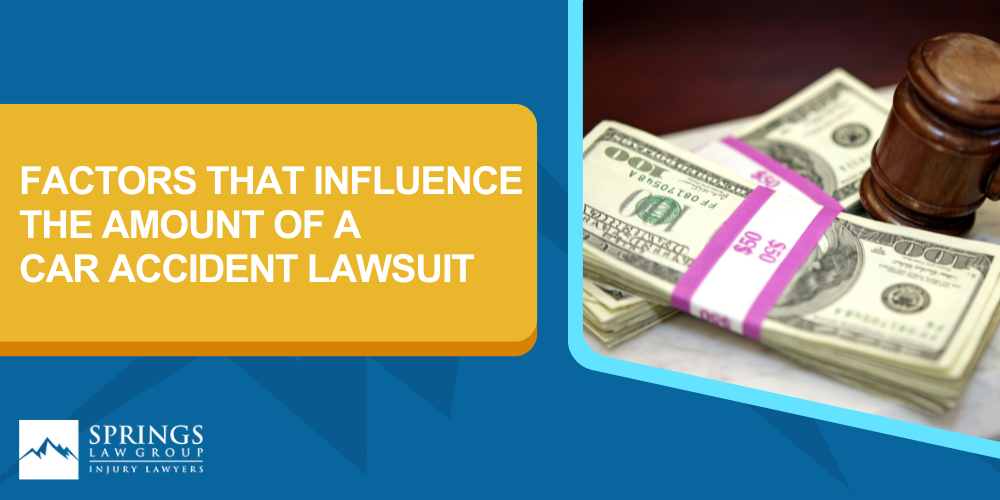
These factors include economic damages, such as medical bills and lost wages, and non-economic damages, such as pain and suffering and loss of quality of life.
Economic damages in a car accident lawsuit refer to the quantifiable financial losses suffered by the injured party.
These damages can be easily calculated and proven with documentation.
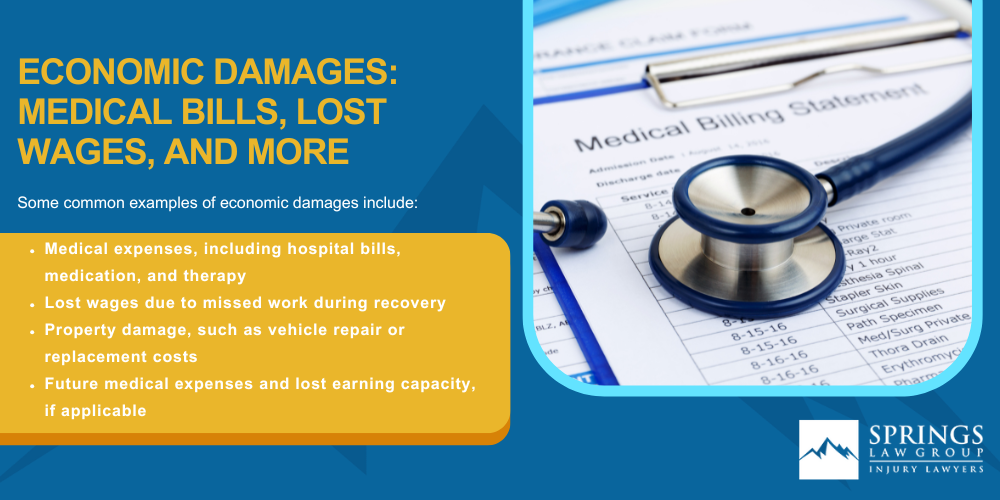
Some common examples of economic damages include:
It is crucial to keep detailed records of all economic damages to support your claim in a lawsuit.
Non-economic damages, also known as “human damages,” refer to the intangible losses suffered by the injured party that cannot be easily quantified.
These damages can significantly impact an individual’s life and are an important part of a car accident lawsuit.
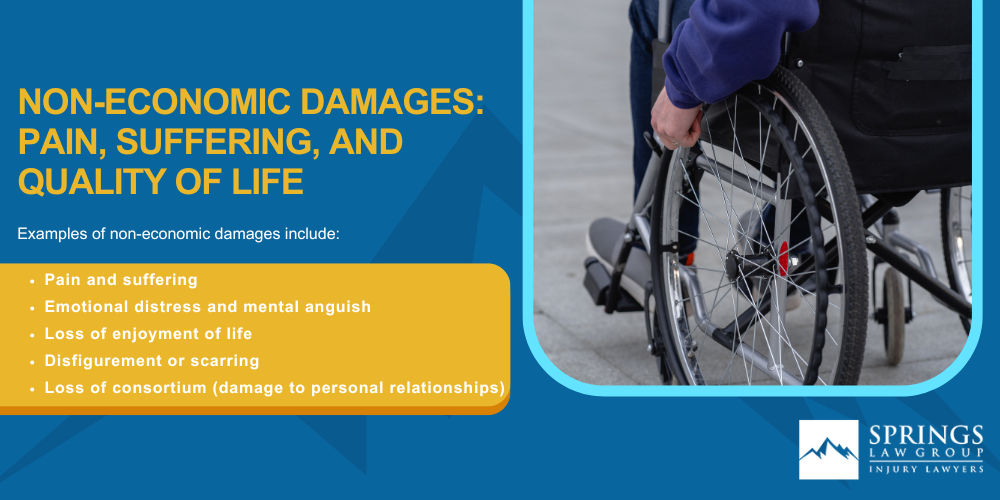
Examples of non-economic damages include:
Proving non-economic damages can be more challenging than economic damages, but an experienced attorney can help demonstrate the accident’s impact on your life.
Liability, or fault determination, plays a significant role in the outcome of a car accident lawsuit in Colorado.
The state follows a modified comparative negligence rule, which can impact the compensation an injured party may receive.
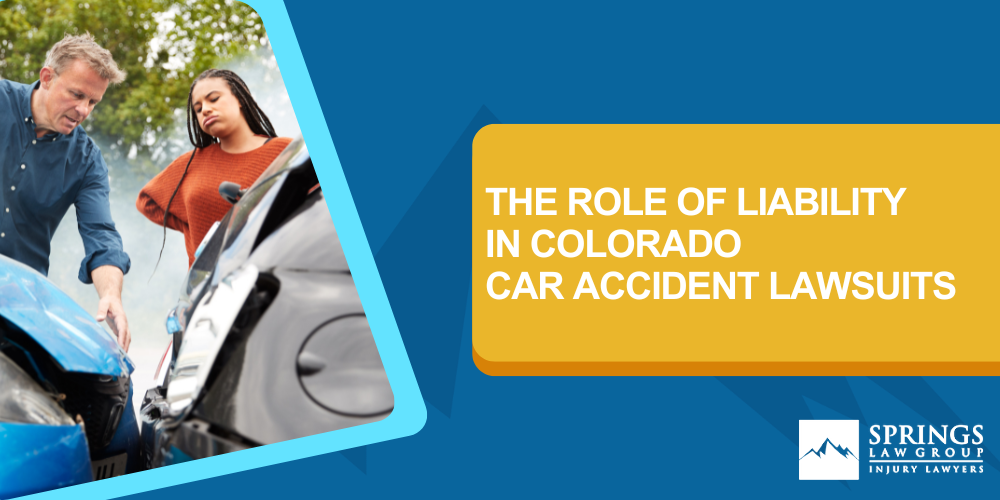
In Colorado, determining fault in a car accident can greatly influence the potential settlement amount.
If the at-fault party is found to be 100% liable for the accident, they are responsible for covering all damages.
However, if liability is disputed or shared, it can complicate the case and affect the compensation received.
Some key points regarding fault determination include:
It is essential to gather evidence and work with an attorney to establish a strong case for liability in your favor.
Colorado follows a modified comparative negligence rule, which means that an injured party can recover damages as long as they are found to be less than 50% at fault for the accident.
If the injured party is found to be 50% or more at fault, they are barred from recovering any damages.
Under this rule:
It is crucial to understand how Colorado’s modified comparative negligence rule can impact your car accident lawsuit and work with an attorney to build a strong case for liability in your favor.
Insurance coverage plays a vital role in determining the potential settlement amount in a car accident claim.
Understanding the at-fault driver’s policy limits and your own uninsured/underinsured motorist coverage can help you make informed decisions about your case.

One of the first steps in a car accident claim is determining the at-fault driver’s insurance policy limits.
This information can provide insight into the potential settlement amount and help guide your legal strategy.
Some important considerations include:
Knowing the at-fault driver’s policy limits can help you set realistic expectations for your case and make informed decisions about settlement negotiations.
In some cases, the at-fault driver may have insufficient insurance coverage or no coverage at all.
In these situations, your own uninsured/underinsured motorist (UM/UIM) coverage can provide a valuable source of compensation.
Some key points about UM/UIM coverage include:
If you find yourself in a situation where the at-fault driver has insufficient coverage, consult with an attorney to explore how your own UM/UIM coverage can help protect your financial interests.
Settlement negotiations in a car accident claim can be an emotional and challenging process.
It is essential to prepare for low initial offers from insurance companies and to counter with facts and evidence to support your claim.

Insurance companies often begin settlement negotiations with low initial offers in an attempt to minimize their financial exposure.
It is crucial not to be discouraged by these low offers and to view them as a starting point for negotiations.
Some tips for handling low initial offers include:
Remember that initial settlement offers are rarely the final word, and with persistence and strong evidence, you can work towards a fair settlement.
To effectively counter low settlement offers and negotiate a fair settlement, it is essential to present compelling facts and evidence that support your claim.
This evidence can help demonstrate the extent of your damages and the impact the accident has had on your life.
Some key types of evidence to gather and present include:
By presenting strong evidence and a well-supported counteroffer, you can demonstrate to the insurance company that you are serious about pursuing fair compensation for your damages.
Seeking professional legal advice from an experienced personal injury attorney at Springs Law Group can provide invaluable guidance and support throughout the car accident claim process.

An attorney can assess the strength of your case and help you navigate the complex legal system.
One of the first steps in working with a personal injury attorney is to have them assess the merits of your case.
During this assessment, the attorney will review the facts of the accident, the extent of your damages, and the available evidence.
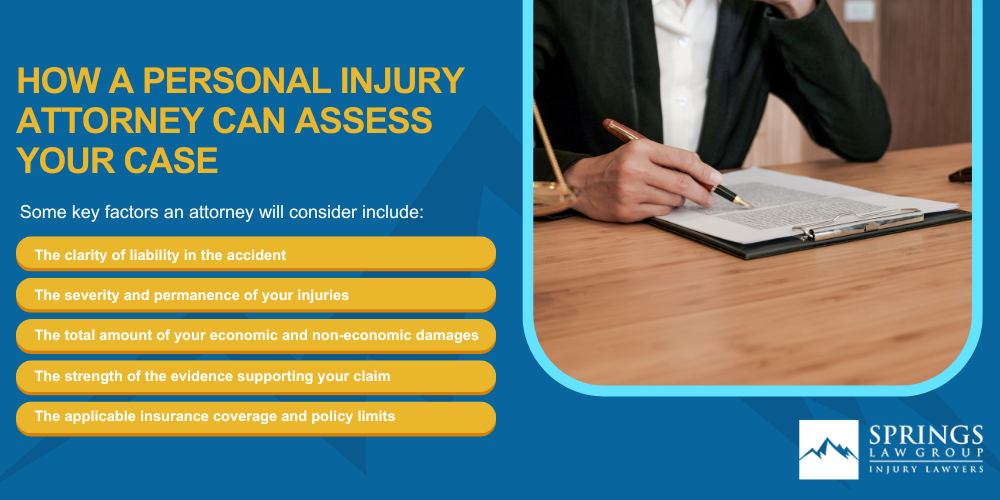
Some key factors an attorney will consider include:
Based on this assessment, the attorney can provide guidance on the potential value of your claim and the best strategy for pursuing compensation.
Having an experienced personal injury attorney on your side can provide numerous benefits throughout the car accident claim process.
An attorney can help level the playing field against insurance companies and their legal teams, ensuring that your rights are protected.
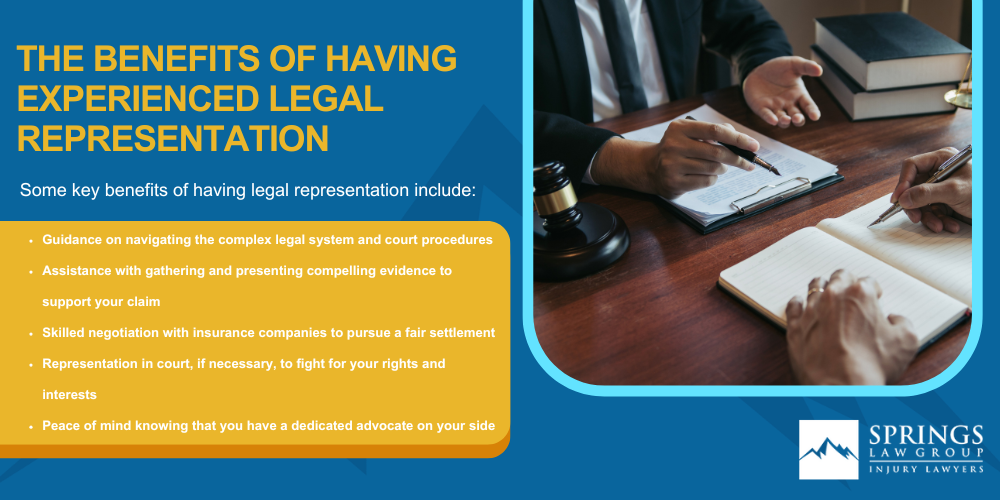
Some key benefits of having legal representation include:
Choosing the right personal injury attorney can make a significant difference in the outcome of your car accident claim and help you secure the compensation you deserve.
A car accident case typically involves several distinct phases, each with its own set of priorities and tasks.
Understanding these phases can help you know what to expect and how to best support your claim.
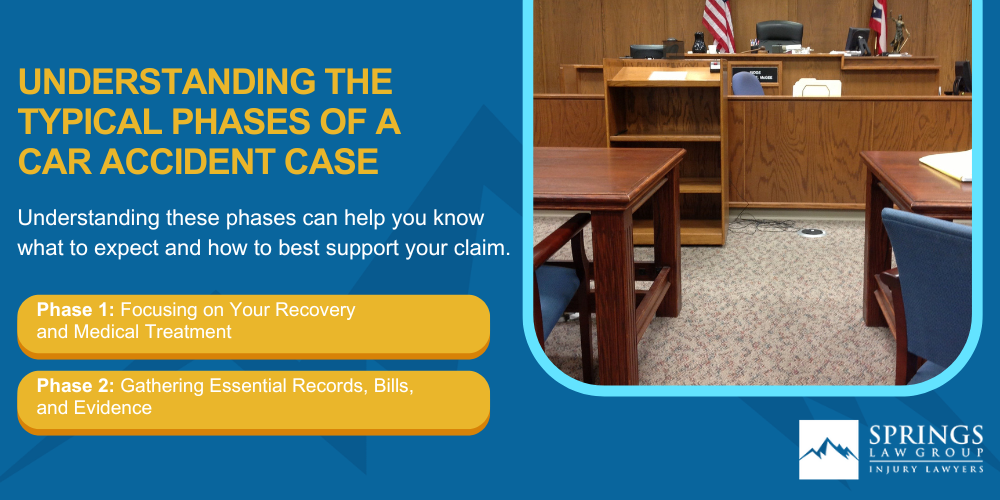
The first phase of a car accident case is centered on your recovery and medical treatment.
During this time, it is crucial to prioritize your health and well-being, attending all necessary medical appointments and following your treatment plan.
Some important steps during this phase include:
While you focus on your recovery, your attorney can work behind the scenes to investigate the accident, gather evidence, and begin building your case.
The second phase of a car accident case involves gathering all the essential records, bills, and evidence needed to support your claim.
This process is crucial for demonstrating the extent of your damages and the impact the accident has had on your life.
Some key types of documentation to collect include:
Your attorney will work to compile this documentation and use it to build a strong case on your behalf.
They may also consult with expert witnesses, such as medical professionals or an accident reconstructionist, to provide additional support for your claim.
The ultimate goal of a car accident claim is to reach a fair settlement that adequately compensates you for your damages.
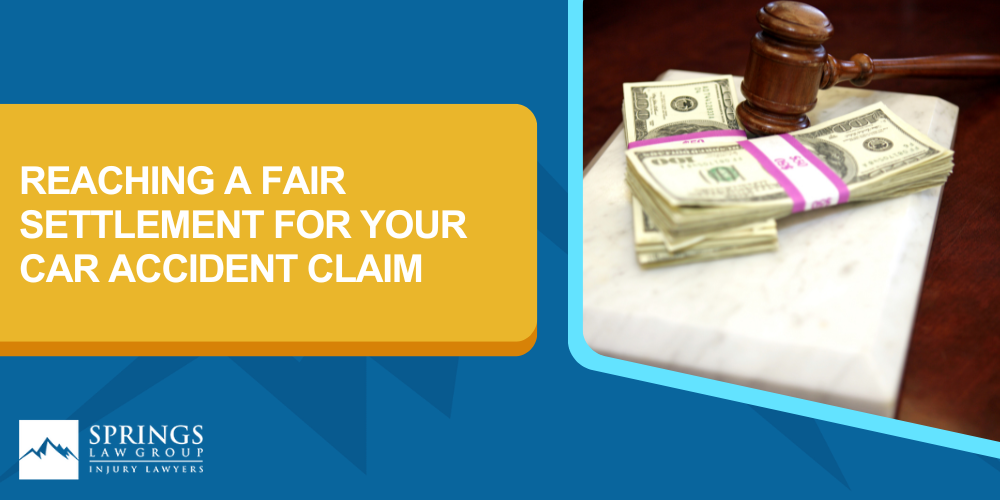
This process involves drafting a compelling settlement demand letter and engaging in negotiations with the insurance company.
A Colorado settlement demand letter is a formal document that outlines your case and the compensation you are seeking.
This letter is typically sent to the insurance company and serves as the starting point for settlement negotiations.
Some key elements of a compelling settlement demand letter include:
Your attorney will work with you to draft a persuasive settlement demand letter that accurately reflects the strength of your case and the compensation you deserve.
Once your settlement demand letter has been sent, the insurance company will typically respond with an initial settlement offer.
This offer is often lower than your demand, and it is essential to be prepared for a negotiation process.
Some key strategies for engaging in effective negotiations include:
Throughout the negotiation process, your attorney will work to protect your rights and interests, fighting for the compensation you deserve.
If a fair settlement cannot be reached through negotiations, your attorney may advise you on the merits of proceeding to trial to seek a favorable judgment.
The amount someone can sue for in a Colorado car accident depends on several factors, including the severity of injuries, medical expenses, lost wages, property damage, and non-economic damages like pain and suffering.
Colorado follows a modified comparative negligence rule, which means the amount of compensation may be reduced if the injured party is found to be partially at fault for the accident.
Colorado does not have a cap on economic damages, such as medical expenses and lost wages, in car accident lawsuits.
However, there is a cap on non-economic damages, like pain and suffering, which is adjusted annually for inflation.
In Colorado, the statute of limitations for filing a car accident lawsuit is generally three years from the date of the accident.
However, it is crucial to consult with an attorney as soon as possible to ensure your rights are protected and to avoid missing any important deadlines.
Yes, under Colorado’s modified comparative negligence rule, you can still sue for damages even if you were partially at fault for the accident.
However, your compensation will be reduced by your percentage of fault, and if you are found to be 50% or more at fault, you will be barred from recovering any damages.
An experienced personal injury attorney at Springs Law Group can help you maximize your compensation by thoroughly investigating your case, gathering evidence, negotiating with insurance companies, and representing your interests in court if necessary.
They can also help you through the legal process, ensure your rights are protected, and fight for the full and fair compensation you deserve for your injuries and damages.

Member of the Colorado Bar Association since 2014. Attorney, Christopher M. Nicolaysen focuses primarily on helping those injured in Colorado car accidents, other auto accidents, and Colorado personal injury incidents.
This article has been written and reviewed for legal accuracy and clarity by the team of writers and attorneys at Springs Law Group and is as accurate as possible. This content should not be taken as legal advice from an attorney. If you would like to learn more about our owner and experienced Colorado personal injury lawyer, Christopher Nicolaysen, you can do so here.
Springs Law Group does everything possible to make sure the information in this article is up to date and accurate. If you need specific legal advice about your case, contact us. This article should not be taken as advice from an attorney.
We use reviews to help show more people like you why we do what we do!

I was uneasy about reaching out to a law firm after being in an accident that left me injured and my vehicle totaled. I don’t care for the idea of suing for what was very clearly an accident. However, after learning more about the overall process of working with a professional team to navigate the murky waters of the insurance world, I was pleasantly surprised to find that the experience wasn’t as gross as I’d originally felt about it.

Springs Law is very friendly and professional. I always felt that they were on my side and cared about my injury and what I was going through. I highly recommend them.

Springs Law Group is an amazing group to work with! I got into a rough accident, and they never ceased to let me know they were there working hard to help me in my hour of need. It was always very easy to reach out to someone if I had any questions, and they were always happy to answer any questions I had.

I never have a problem with getting a response when I need them – which is not the case with most other firms. They really truly care about each client. As a plus, they always have positive attitudes, which matters tremendously when you are in a stressful legal situation.

Big thanks to Mr. Jake Kimbell and his team for their assistance with my case. He helped me through an incredibly challenging part of my life, and most importantly helped navigate through the convoluted legal channels of my case. I cannot thank him and his team enough for their support.

The entire team at Springs Law group has been nothing but amazing. Jake and the rest of the staff were great to work with and extremely professional. They were very attentive and answered any questions and concerns I had. I was always able to contact them and they were very responsive and communicated with me.

Springs Law Group is an amazing group to work with! I got into a rough accident, and they never ceased to let me know they were there working hard to help me in my hour of need. It was always very easy to reach out to someone if I had any questions, and they were always happy to answer any questions I had.





